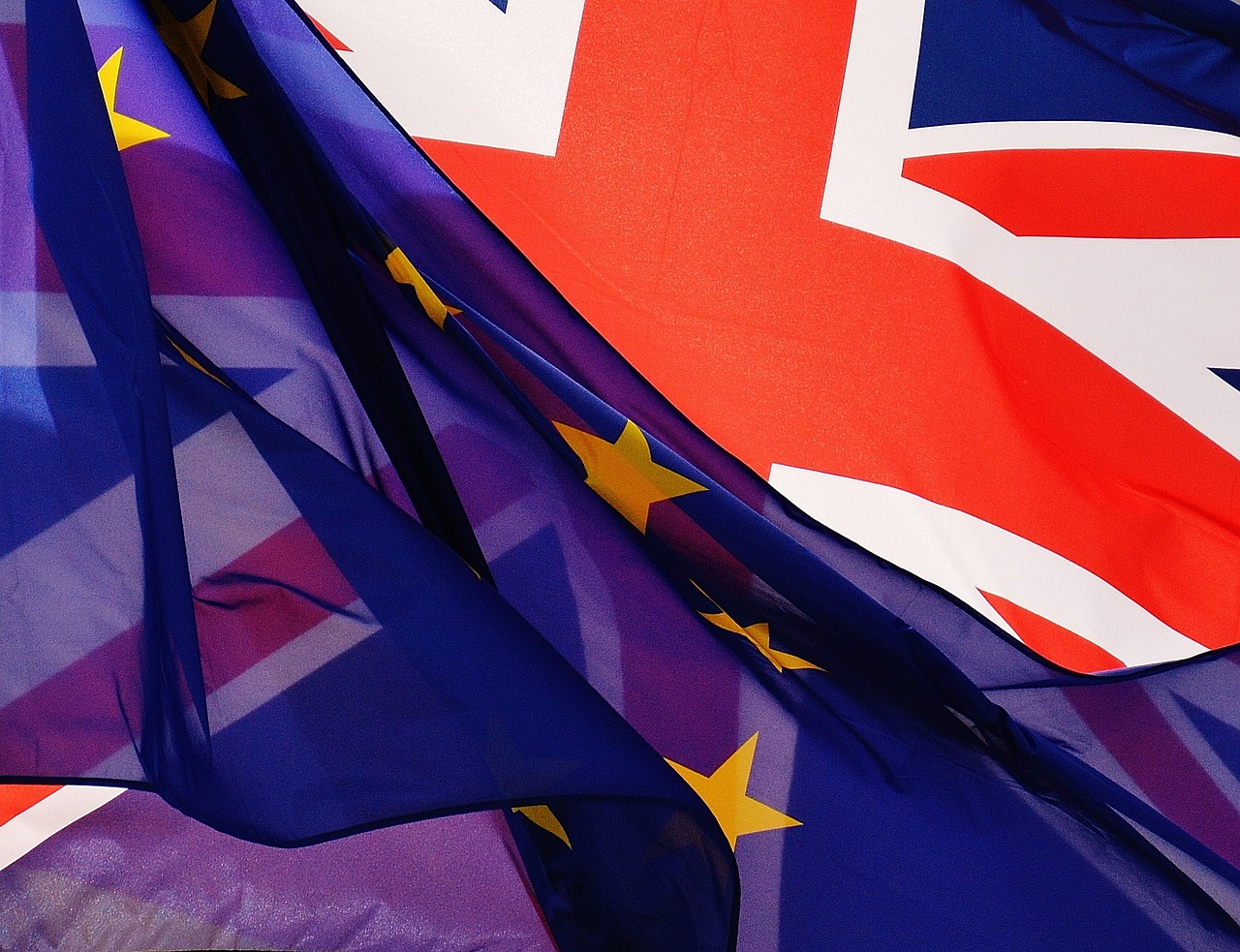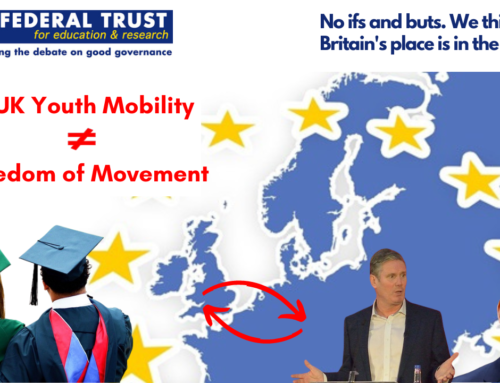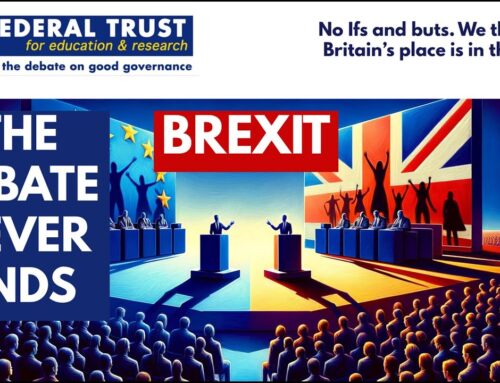The impact of Brexit, linked to wrong-headed right-wing economic and social policies also part of the Conservative-LibDem policy matrix for Britain since 2010, has had the biggest political-economic-social impact on peace-time Britain in more than a century.
The political class has disintegrated. Britain was famous for its political stability. Now we look worse than the French fourth republic or the new government in Argentina. There have been five prime ministers since Brexit. Seven ministers of foreign affairs, nine ministers of justice and nineteen transport ministers since David Cameron and Nick Clegg formed the government that gave the green light to the Brexit plebiscite and its consequences.
The Conservatives refuse to discuss Brexit. Nor does Labour. Yet future historians will conclude that cutting links with the EU is the most stupid decision by a big nation since the United States congress voted to ban the sale of alcohol in 1917.
The main promise of Brexit was that Britain would again control immigration.
Instead we have nearly one million immigrants from Pakistan, India and Nigeria brought into Britain by Rishi Sunak last year to do the work that before was done by European citizens.
The workers who came from France or Spain or Poland to work with us came from a culture of democratic freedom and workplace rights guaranteed by law or trade union agreements with employers.
That is not the case with the 100s of 1000s of replacement workers shipped in by Rishi Sunak to form a new helot class of workers in many cases at the beck and call of anti-union British bosses.
The government appointed anti-slavery commissioner, Eleanor Lyons, has stated she is “deeply concerned about the risk of exploitation and modern slavery for workers in the adult social care sector, particularly those from overseas who have come to the UK on short-term visas.”
Anti-slavery NGOs are reporting people coming to Britain to replace European care workers having to pay over £11,000 to agents and unscrupulous care-home owners when the true cost of flight and visas is around £1500.
Many of these replacement immigrant workers are not working the hours they were promised by British employers when they were lured to come in and replace European citizens and are obliged to live in cramped and substandard accommodation.
Care homes must register with the Care Quality Commission. Its chief inspector, James Bullion, told MPs late in 2023 that cases of modern slavery in the care system have increased ten-fold since Brexit was imposed on Britain by Boris Johnson in 2020.
Immigration has become the most important issue for British citizens and made far worse by Brexit.
Brexit means our school children cannot go on Erasmus exchange programmes.
While EU citizens working for British investment funds and service sector consultancies can go and work on a project in a European city, thus keeping up the export level of the UK services sector, holders of just a British passport cannot.
The Irish government has issued 1 million passports to Brits who have an Irish grandparent or who were born in Northern Ireland. Most of the anti-European politicians in the Democratic Unionist Party have taken up the right to have an EU passport to travel freely or reside in Europe. In turn they deny this right to the rest of UK citizens. The loss of sovereign rights we once enjoyed as citizens of a democracy in full partnership with its neighbours should be challenged, not bovinely accepted.
Now we are told that Eurostar may limit the passengers travelling from St Pancras to France and Belgium because the Tory hard Brexit means Brits need to go through longer biometric border controls later in 2024.
More holidays ruined or business travel delayed was described in a recent letter to the Financial Times as one of the “trifling inconveniences” of Brexit.
This kind of sneering putdown of the disruption Brexit is causing ordinary British citizens who would like to holiday on the continent is not convincing anyone of the claimed advantages of Brexit.
It is already impossible to bring a young French or Polish woman au pair to help with a family in England.
Already, ahead of any new passport controls the queues for Eurostar and the Eurotunnel for the British who would like to go to France become longer and longer.
The Daily Mail recently ran a poignant story about a British couple in their 70s whose dream of retiring to a house in France they had bought is shattered because under rules imposed by Boris Johnson they like all British citizens can only stay for 90 consecutive days in an EU member state and then must leave.
All this was made perfectly clear in the run-up to the 2016 plebiscite. Too many preferred to believe the fabulations from Boris Johnson published in the Daily Telegraph – where else?- that the “British people will still be able to go and work in the EU; to live; to travel; to study; to buy homes and to settle down. There will continue to be free trade, and access to the single market.”
Now we know better.
There is nothing positive about Brexit. Nothing.
Compared to the GDP in the Eurozone before Covid – just before the Brexit measures reducing trade and investment were fully implemented – the growth of GDP the Eurozone was 3.0% higher than the UK. The other G7 economies had higher growth than the UK over this period, including the US where GDP was 7.4% higher.
The value of foreign direct investment into the UK, i.e. inward flows, into the UK were worth -£51.7 billion, down from £34.8 billion in 2020. A report published by the Britain in a Changing Europe think-tank in January said that UK growth in trade – exports and imports – of goods has been the ‘weakest in the G7’.
Media economists like Liam Halligan point to growth in employment since Brexit, but that is on the basis of importing cheap labour without any of the trade union rights under EU legislation that European citizens shared with British workers before Brexit.
During the current parliament under Johnson and his successor Brexit era prime ministers overall living standards have fallen – for the first time since record started being kept.
A report by Cambridge Econometrics argues that the British economy is almost £140 billion smaller because of Brexit. London’s economy has shrunk by £30 billion. Some will challenge these figures and in truth ping-ponging different economist’s data is not edifying.
It would be best to see Brexit not as an instant reduction of British wealth but a slow puncture which is seeing the numbers of major firms on the London Stock Exchange down by a quarter, and especially outside London high streets with fewer businesses and a shabbiness about town centres in the Midlands and North reminiscent of Eastern Europe, compared to the richer town centres and regions of European Community Europe.
Life expectancy in two poor London boroughs is going down – again a first in Britain for many decades. To be sure, it isn’t all about Brexit. But the relentless flow of bad economic and social news which begins with the decision to cut trade and other links with like-minded nations across the Channel cannot be dismissed as irrelevant or of no consequence.
The problem for British firms and employment will get worse. Britain imports 70 per cent of all the fresh food we consume from the continent. New rules agreed by Johnson and his successors mean that all food products need an Export Health Certificate signed by vets on the continent.
This is a major additional cost especially as the necessary vets may not be in place in some EU nations. While Lidl, Aldi, Tesco and other big chains can pay for this and pass on the cost to consumers thousands of smaller high street grocery shops selling ham, cheeses, shell-fish and other fresh food delicacies from Europe cannot pass on these Brexit costs to customers or have the specialist know-how to do the paperwork.
Fresh food arrives in chilled or refrigerated lorries on a just-in-time basis often with pallets from different suppliers going to different customers in the UK in the same lorry. It’s called ‘groupage’ in the food delivery trade.
But the British government is insisting these “groupage” lorries go to special lorry parks to wait until the few inspectors available check everything. If one product is found to be faulty the whole lorry load may face being thrown away with serious loss of revenue to both the distributors and the small British delicatessens waiting for their products to arrive.
Britain in the form of Trade Secretary Kemi Badenoch, the rising star of the hardline Brexit Tories, has failed utterly to secure a free trade deal with Canada. Britain’s most important export to Canada are £780 million worth of Jaguars and Land Rovers made in the West Midlands.
Because of Ms Badenoch’s incompetent negotiating style, new tariffs could be placed on Jaguars and Land/Range Rovers. British cheese exports are also threatened as Ms Badenoch refused to endorse Canadian products she did not want sold in Britain. For Brexit ideologues trade is one way and the rest of the world should be grateful they can buy British goods without expecting that their locally made products should be sold in Britain.
She, like other Brexit boosters and boasters, will have to back down but this hokey-cokey ministerial amateur hour in serious trade negotiations is not only embarrassing but damaging to British manufacturers and exporters.
Most of the Tory campaigners for Brexit have now left politics or will go at the next election.
England is now the sick man of Europe with millions living below the poverty line, patients waiting 2 years or longer for a simple operation, municipalities bankrupt and all the élan, or energy in Britain much weaker than before.
Two years ago secret figures from the Ministry of Defence showed that all but one of its 33 infantry battalions were well short of combat-ready troops. The Scots Guards which look very handsome in their bright red uniforms outside Buckingham Palace had only half of their regular number of soldiers in uniform and trained to fight. The Royal Navy has just 29 ships (aircraft carriers, submarine, destroyers and frigates.)
Germany sends twice as much military aid to Ukraine as does Britain. (£4.6 bn UK; 10.5 bn Euros Germany)
Brexit has hit British businesses who can no longer export to European markets as before.
According to a British Chamber of Commerce report published in December 2023
- 60% of firms trading with the EU say it is now more difficult to do so than it was a year ago.
- 49% of firms exporting goods and service reject the official UK government line that the Brexit arrangements with the EU is helping them grow sales.
- 41% of firms exporting to Europe say they face difficulties adapting to its rules on buying and selling goods.
The introduction this year of the EU’s “Export Health Certificate” (EHC or certificate sanitaire d‘exportation) which is part of the new regulations put in place by London and Paris to ensure that animal food products entering or leaving Europe are completely safe for human consumption is causing great difficulties for the thousands of small British grocery stores in all our cities and towns which sell sausages, continental hams and cheeses, or patés, or shell fish from the continent.
The paperwork is complicated and many suppliers across the Channel do not know what is expected of them.
It will cost small business owners new money for translation and checks. The British government is not helping as it takes the view of sauve qui peut on any imports from the EU.
Britain’s new Old Etonian Foreign Secretary, Lord David Cameron, has been busy trying to show the UK has presence and influence in geo-political affairs after the weak performance of most foreign secretaries since Brexit.
Yet Lord Cameron is hobbled because the UK no longer has any influence or voice in the foreign and defence policy of Europe. In the global conflict of the northern world’s democracies to support the right of a Ukraine to remain a democracy against Russia’s World War 2 Nazi type invasion Britain works with the United States and European governments to send arms to Ukraine.
But in other areas of tension which affect Britain like the West Balkans, and the Mediterranean the transit regions for mass people movement, Britain is absent from all the decisions taken by the governments that regularly meet and draw up policy on behalf of Europe.
Britain is now a taker not a maker of key foreign policy decisions thanks to Brexit isolationism.
The Tories appear happy with this state of affairs. For the time being Labour prefers to see, speak, and hear no Brexit. But this omertá is not going to be sustainable if Labour does form a government. Then it will be impossible for Labour to blame Boris Johnson and other Conservative ministers responsible for the lies that led to the Brexit vote in the 2016 plebescite and for the ultra hard rupture with European nations since 2020.
The responsibility will then lie with Labour ministers, including the Prime Minister. Saying nothing about the damage of Brexit may work before the election. It is pointless from Labour’s point of view to set headlines rolling about “Rejoining the EU” or “Reversing the 2016 Plebiscite.” Referendums are not a higher form of democracy. The Swiss voted in a referendum in 2010 to reject freedom of movement for EU citizens and then reversed that decision a decade later when businesses from care homes to the Alpine tourist industry realised they were running out of staff to stay in business.
There is no reason to assume that the British people are forever going to impose harm upon themselves as they see the damage Tory isolationism is causing us.
But once in power Labour will need a policy for government, not brief sound-bites for opposition. The examples to look at can be found in Norway or Switzerland, two proud historic European nations, like Britain, whose citizens voted against joining the EU when it was formed in the early 1990s.
But over time both the Swiss and the Norwegians came to realise that just saying No to Europe was not a policy that helped either country.
So they began difficult, tortuous negotiations to restore trade and travel links.
Since 2016 British economic actors and influencers (CBI, the City, the British Chambers of Commerce, Make UK, the National Farmer Unions) have avoided commenting on Brexit. Politically, the sector tends to be aligned to the Conservative Party and many firms rely on government grants, aid, permissions, tax breaks, or subsidies. Their CEOs were never going to attack Tory ministers who decided what levels of taxpayers’ money would go to help business.
In addition, the majority of the press, especially that owned by men who paid no tax in Britain, had invested so much in winning Brexit they were unlikely ever to admit it is not working.
The BBC in particular seemed to avoid carrying any reports from non-Brexit partisan media like the Financial Times which told the truth about the negative aspects of Brexit.
It is likely that with a change of government economic actors will no longer give Labour ministers the benefit of the doubt if Labour insists that the Boris Johnson ultra hard Brexit cannot be changed.
The Brexit revolution seems to have devoured a lot of Tory anti-European revolutionaries. It took Labour 40 years from the Labour government’s initial rejection of partnership in Europe when first proposed in 1950 to come round under John Smith and Tony Blair to agree with Margaret Thatcher and Harold MacMillan that Britain was stronger as a partner agreeing some common rules with other allies and friends across the Channel or Irish sea.
British Tories are the oldest continuous party of government in European history often holding the reigns of power in Britain for 250 years. Now and then the Tories have taken a major wrong turning notably with protectionism at the start of the 20th century or appeasement of fascist dictators a century ago.
But the Tories’ hunger for power produced corrections and new policies which corresponded better to the nation’s needs. How long before a new Tory MP, elected in 2024 not carrying any of the Brexit war baggage of the previous two decades, announces that it is time the Conservatives looked again at the hostility to Europe which is likely to lead to electoral disaster for them?
Labour does not have to make any grand declarations but simply make clear that, once in government, Labour will work pragmatically and systematically with economic and civil society, as well as ending the anti-European rhetoric of Rishi Sunak, Liz Truss and Boris Johnson and other discredited right-wing Tories who have indulged in easy sneers and insults aimed at our near neighbours in Europe.
Labour is too big and important a party of government to bury its head in the sand and hope that wiggling its bottom in the air will be attractive to voters and to any would-be investors in Britain.






Leave A Comment